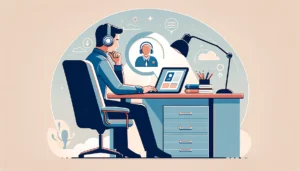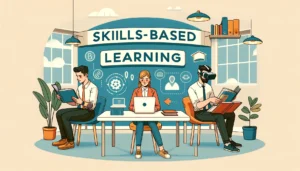From Redundancy to Reskilling: Why investing in your people is more important than ever
- 5 Min Read
Organisations looking to survive and thrive longer-term need to invest in developing new skills and capabilities internally, as it is becoming increasingly difficult to source scarce talent in the external market.
- Author: Gillian Pillans
- Date published: Mar 6, 2024
- Categories

2024 looks set to be a year of ongoing economic turbulence, with the IMF predicting global growth rates will remain below historical averages and inflation will remain high. Faced with a gloomy economic outlook, it is not surprising that many organisations are predicting a rise in redundancy rates in 2024.
Our research suggests that organisations that plan to adopt a hire-and-fire approach to managing their workforces could soon discover they are unable to execute their business strategies effectively.
Factors including changing demographics, technological advancements like generative AI, evolving social norms, and the imperative to achieve Carbon Net Zero mean that the workforce and even the nature of work itself are changing fast. Skills shortages are commonplace.
Organisations looking to survive and thrive longer-term need to invest in developing new skills and capabilities internally, as it is becoming increasingly difficult to source scarce talent in the external market.
Our research highlights four critical factors that organisations need to consider as they develop their workforce plans:
1. An ageing and shrinking workforce
The world population is ageing in an unprecedented fashion. The global workforce is shrinking and almost all advanced economies will see the share of population aged between 20 and 64 decline over the next decade. This situation is not just confined to the developed economies: many emerging economies are ageing rapidly too. Employers globally will find they are fishing in ever shallower talent pools.
2. The impact of GenAI on jobs
The advance of generative AI and opportunities for automation of work offer huge possibilities for companies to renew their business models, increase productivity and reduce costs. GenAI is likely to prove both an opportunity and a threat to jobs.
On the one hand, studies (most famously a 2013 Oxford Martin study) predict up to half of jobs are at risk of automation over the next 10-20 years. On the other hand, analysis by the World Economic Forum finds that many more jobs will be created than will be destroyed by artificial intelligence and automation.
However this is not necessarily good news for employers or employees. These new jobs are unlikely to be in the same locations as those which are lost and will require different skills, which will be in high demand from employers across industries and geographic locations.
3. The Shift to Carbon Net Zero
The shift to Carbon Net Zero is speeding up with many governments setting legally binding targets for 2050 or earlier. The work needs to begin this decade, and the impact on jobs will be significant. A transition of this nature will inevitably make some skills obsolete while creating demand for new ones. Jobs will be destroyed, created and, perhaps most importantly, changed.
All this will be taking place against a background of rising skills shortages. All major economies will be trying to do the same things at the same time and will therefore be needing the same sorts of workers. Those countries and companies with a buy-not-build approach to employee resourcing may find themselves in difficulties.
4. Changing expectations of employers
Companies are facing increasing scrutiny from the public, media and investors with directors being held responsible not only for financial performance, but also for running companies according to broader ESG interests.
This scrutiny extends to their treatment of employees, with stakeholders expecting fair wages, decent working conditions, and a commitment to diversity and inclusion. Stakeholders increasingly expect organisations to apply the lens of sustainability to their workforce as well as their operations. It is becoming less acceptable to hire and fire at will.
For some companies, the wider social and economic impact of the employment they bring to the local community is part of their license to operate. Employers have to think carefully about how to mitigate the social impact of reduced employment. Talent sustainability, achieved through upskilling and reskilling initiatives, is paramount.
Putting the building blocks together
In the face of the macro shifts outlined above, many employers are developing novel strategies to develop the skills they need, including reskilling their existing workforce. This makes sense economically, as reskilling programmes deliver a positive return on investment, and practically, as employers can access pools of people who already understand their business and are highly engaged.
What actions can organisations take to tap into the benefits of reskilling? Our research identifies the following four priority actions:
- Build a picture of your future skills needs and key gaps between what you have and what you need. It’s not necessary to have a complete strategic workforce plan – you can begin in those parts of the business where you already anticipate greatest change, such as obsolete technology being replaced or business transformation underway.
- Create learning and development pathways for specific role transitions where you anticipate highest risk of redundancy in the medium term. Start small, experiment and scale as you learn
- Encourage talent to flow to emerging roles and opportunities, for example through deploying an internal talent marketplace.
- Engage in ongoing dialogue with your employees about how your organisation’s strategy is shifting and what it means for skills. Make the dialogue two-way by asking employees to articulate their needs, concerns and aspirations, thereby fostering a collaborative approach to skill development and career advancement
By prioritising these measures, employers can build a future-fit workforce that is adaptable and resilient, thereby positioning themselves for success in an ever-changing landscape of work.
Gillian Pillans is an HR strategy and organizational development expert and Research Director at Corporate Research Forum.









